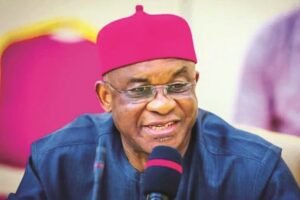A prominent pro-democracy group, Benue Concerned Democrats (BCD), has raised serious concerns over the political reemergence of former Senate President David Mark, accusing him of orchestrating a strategic takeover of the African Democratic Congress (ADC) under the guise of a “Coalition for 2027.” The group alleges that this move is designed to revive his political career and restore his influence within Nigeria’s evolving democratic landscape. In a detailed statement issued in Abuja on Monday, the Convener of the group, Arc Idoha Audu Anuga, described the development as a classic case of “recycled opportunism” and warned that allowing Mark to return to national politics through the ADC would be a major setback to Nigeria’s democracy.
The BCD’s statement, which is gaining traction within political circles and on social media platforms, highlights a renewed concern about the growing trend of political veterans seeking relevance through new parties and coalitions ahead of the 2027 general elections in Nigeria. Arc Anuga did not mince words, describing David Mark’s alleged plot as a dangerous revival of a “failed and authoritarian playbook,” pointing to his chequered past and what he called a legacy of anti-democratic conduct. He reminded Nigerians of Mark’s infamous association with the Association for Better Nigeria (ABN), which played a pivotal role in truncating the June 12, 1993, presidential mandate of Chief Moshood Kashimawo Olawale (MKO) Abiola. “David Mark is no democrat. His anti-democratic credentials are well documented. During the critical period of our democratic struggle, he aligned with the enemies of democracy, not the people,” Anuga asserted.
Further intensifying the criticism, the group accused the former Senate President of leaving behind a hollow legacy in Benue South Senatorial District. According to BCD, David Mark’s 16-year stint in the Nigerian Senate was marked by legislative dormancy and a lack of impactful representation. Anuga alleged that under Mark’s leadership, the Senate functioned more as a ceremonial chamber than as a robust check on executive power, contributing to what he termed the “worst-performing legislative era” in the nation’s democratic history. He also referenced alleged electoral malpractices during Mark’s controversial contest against Alhaji Usman Abubakar, accusing him of political manipulation and electoral fraud.
The group expressed deep frustration over what they described as years of federal neglect in Benue South during Mark’s time in the Senate. “For all his years in power, there is no landmark federal project to show, no legacy of sustainable empowerment or inclusive development. His people are left with nothing but the remnants of wasted years and broken promises,” the group lamented. They called on Nigerians to be vigilant and to reject any effort to repackage old political figures who they believe have outlived their relevance in Nigeria’s forward march toward accountable governance.
Reacting to Mark’s new role in the so-called “Coalition for 2027,” the BCD warned that the ADC risks losing its credibility if it allows itself to be hijacked by individuals with questionable political histories. “If the ADC truly hopes to position itself as a platform for credible alternative governance in 2027, then it must draw a clear line between itself and those who represent Nigeria’s political rot. You cannot rescue democracy with those who undermined it,” Anuga said, adding that the coalition’s reliance on Mark is both misguided and dangerous for the country’s democratic evolution.
The group went further to critique the broader political style of David Mark, referencing both his military and civilian careers. According to BCD, Mark’s leadership trajectory has consistently been marked by authoritarianism, abuse of office, and suppression of dissent. “From khaki to agbada, his signature has remained the same: fear, not service; control, not development,” the group stated, reflecting a sentiment that resonates with growing calls for a generational shift in Nigeria’s political leadership.
The BCD’s call echoes the sentiments of many Nigerian youths and civil society advocates who believe that the 2027 elections should mark a definitive departure from the old guard. “We reject David Mark’s attempted reincarnation in whatever form. Nigerians deserve a clean break from yesterday’s men. He represents the rot of the past, not the hope of the future,” the group concluded.
As Nigeria edges closer to the 2027 elections, the political space is becoming increasingly charged with debates over legacy, leadership credibility, and the urgent need for national renewal. The unfolding drama surrounding the African Democratic Congress and the alleged role of David Mark is expected to remain a focal point in the country’s pre-election discourse, particularly as voters and civil society organisations demand transparency, accountability, and genuine democratic values in Nigeria’s next chapter.


